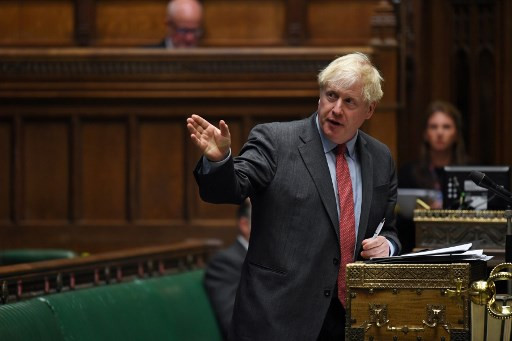Popular Reads
Top Results
Can't find what you're looking for?
View all search resultsPopular Reads
Top Results
Can't find what you're looking for?
View all search resultsBoris urges caution as virus cases fall for seven days in UK
Recorded infection rates across the UK have dropped for seven consecutive days with 23,511 new cases announced on Tuesday compared to 46,558 a week earlier -- a fall of nearly 50 percent.
Change text size
Gift Premium Articles
to Anyone
 A handout photograph released by the UK Parliament shows Britain's Prime Minister Boris Johnson speaking as he announces to MPs the new Government's new restrictions relating to the COVID-19 pandemic, in the House of Commons in London on September 22, 2020. - Britain on Tuesday tightened restrictions to stem a surge of coronavirus cases, ordering pubs to close early and advising people go back to working from home to prevent a second national lockdown. Pubs, bars and restaurants were ordered to shut at 10:00 pm (2100 GMT) across England and Scotland, and new limits were announced on public gatherings such as weddings. (UK Parliament/AFP/Jessica Taylor )
A handout photograph released by the UK Parliament shows Britain's Prime Minister Boris Johnson speaking as he announces to MPs the new Government's new restrictions relating to the COVID-19 pandemic, in the House of Commons in London on September 22, 2020. - Britain on Tuesday tightened restrictions to stem a surge of coronavirus cases, ordering pubs to close early and advising people go back to working from home to prevent a second national lockdown. Pubs, bars and restaurants were ordered to shut at 10:00 pm (2100 GMT) across England and Scotland, and new limits were announced on public gatherings such as weddings. (UK Parliament/AFP/Jessica Taylor )
P
rime Minister Boris Johnson called for caution Tuesday as Britain registered lower coronavirus case numbers for seven days in a row -- a decline that has surprised officials and experts.
Recorded infection rates across the UK have dropped for seven consecutive days with 23,511 new cases announced on Tuesday compared to 46,558 a week earlier -- a fall of nearly 50 percent.
The reversal after weeks of rising rates has coincided with the removal on July 19 of nearly all pandemic rules in England, including legal requirements for social distancing and wearing a mask in public indoors.
It has confounded the government and scientists, who had previously warned cases would likely surge to 100,000 a day in the weeks ahead after the restrictions were eased.
Despite the turnaround, which comes after the start of summer school holidays in England and Wales, ministers are warning the long-term situation remains uncertain.
While daily case numbers have fallen, official data also showed 131 deaths from Covid within 28 days of a positive test were registered on Tuesday, the highest daily death toll since March.
Read also: UK to donate vaccines to C'wealth, Asian nations
The overall death toll in Britain since the start of the pandemic currently stands at 129,303.
"I have noticed that obviously we have six days of some better figures but it's very, very important that we don't allow ourselves to run away with premature conclusions about this," Johnson said before Tuesday's figures were published.
"People have got to remain very cautious and that remains the approach of the government," he added.
Johnson himself ended 10 days in self-isolation late Monday after being in close contact with Health Secretary Sajid Javid, who tested positive for Covid-19 earlier this month.
The prime minister argued that Britain's successful vaccination campaign -- which has seen 70 percent of adults receive both jabs -- allowed for the relaxation of legal curbs last week.
But the move attracted widespread criticism, with fears the state-run National Health Service could again come under severe strain from rising caseloads, even if far fewer people are now dying of Covid.
Experts have struggled to explain why infections appear to have declined so dramatically since early last week.
The end of the Euro 2020 football tournament -- which was blamed for a spike in cases among younger men gathering to watch games -- as well as the school holidays and a mini-heatwave have all been mooted as factors.
Read also: Don't get carried away with falling COVID-19 cases: UK PM
Stephen Griffin, from Leeds University School of Medicine, said the requirement for individuals to isolate under Covid-19 tracing rules -- in what has been dubbed a "pingdemic" in Britain -- could have had a "direct impact upon transmission" and lowered case numbers.
Professor Karl Friston, from University College London, said it remained a "key question" whether Britain would "prepare effectively for a winter resurgence".
This would be crucial, he explained, as attention shifts from "mortality to morbidity, such as long Covid and post-Covid syndrome, and the secondary effects on healthcare beyond Covid-19".









